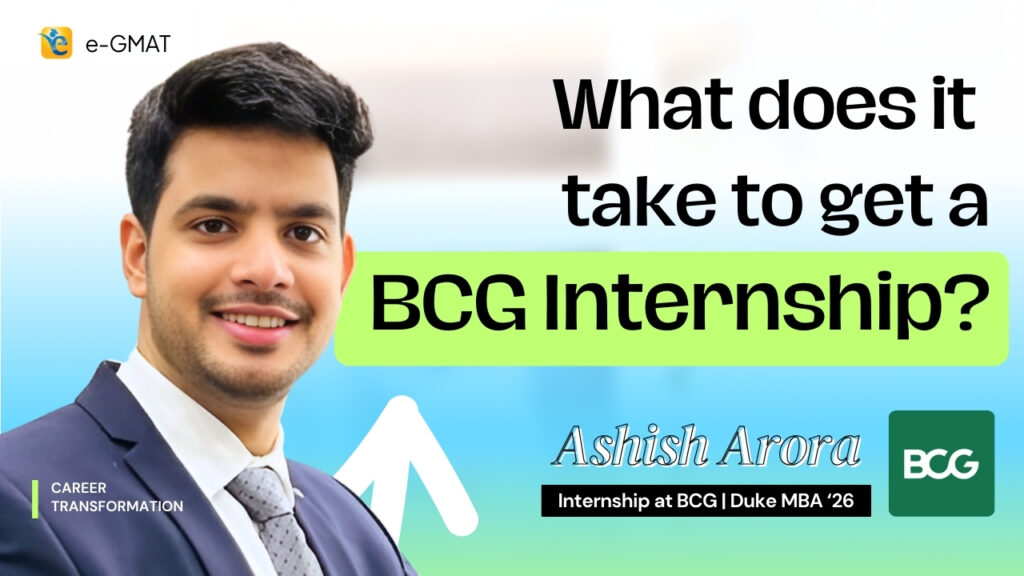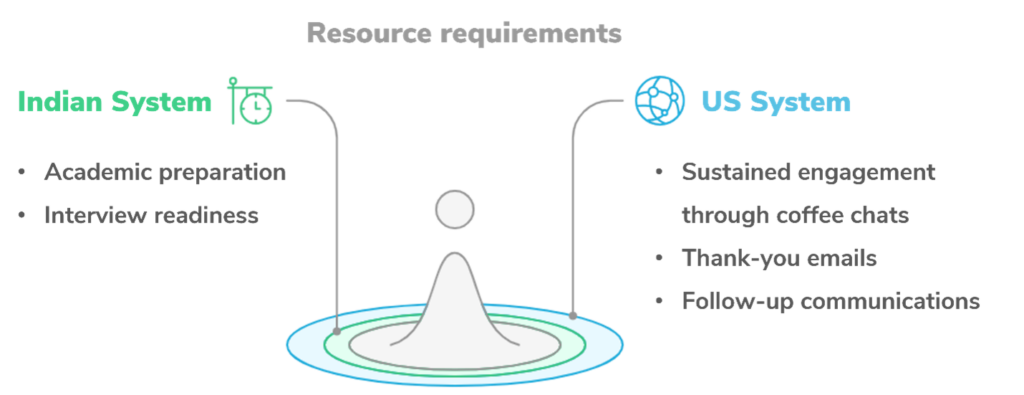For international students transitioning from India to American business schools, the consulting recruitment process often delivers their first major culture shock. The contrast between the two systems couldn’t be starker: while Indian recruitment follows a structured, examination-based approach with quick results, the American system operates on a complex network of relationships built over months.
In India, if you come from a premium institute, they serve jobs to you almost on a platter. All you need to do is maintain decent grades and prepare for that interview before the day.
“In India, if you come from a premium institute, they serve jobs to you almost on a platter,” explains Ashish, a Fuqua School of Business student who recently secured a consulting internship. “All you need to do is maintain decent grades and prepare for that interview before the day.” The Indian system typically involves companies visiting campus, conducting aptitude tests, and making same-day offers – a process that’s both efficient and predictable.
The American consulting recruitment landscape, however, operates on fundamentally different principles. Rather than immediate assessment, it emphasizes relationship-building through a series of informal meetings known as “coffee chats.” This system often catches international students off guard, particularly those accustomed to more straightforward recruitment processes.
The US recruitment system first of all blew my mind. I didn’t research about how things go about and how things are usually done here. When I came here and started hearing from second-years… it was different. It was very overwhelming
“The US recruitment system first of all blew my mind,” Ashish admits, reflecting on his initial exposure to the process. “I didn’t research about how things go about and how things are usually done here. When I came here and started hearing from second-years… it was different. It was very overwhelming.”
The shift requires more than just procedural adaptation; it demands a complete mindset change. Where Indian recruitment rewards academic performance and test-taking abilities, the American system values networking skills, relationship-building capacity, and long-term engagement with potential employers. This transformation can be particularly challenging for international students, who must navigate these cultural differences while managing the regular pressures of business school.
Career Management Centers (CMCs) at business schools recognize this challenge and typically provide a buffer period. At Fuqua, for instance, students receive a month-long summer term to acclimate before formal recruitment begins. However, even with this preparation, the transition can be jarring, especially when coupled with other adjustments like being away from family and adapting to a new educational environment.
The extended timeline of US recruitment – spanning several months rather than days – adds another layer of complexity. This prolonged process, while allowing for deeper connections and more informed decisions, can create significant anxiety for international students, particularly those managing educational loans and visa considerations.

The Structural Divide: Indian vs. US Consulting Recruitment
The fundamental differences between Indian and US consulting recruitment systems extend far beyond mere cultural variations, encompassing everything from timeline to evaluation criteria. While both systems ultimately aim to place qualified candidates in consulting roles, their approaches couldn’t be more different.
In India, the recruitment process follows a tournament-style structure. “Companies come on campus, you sit for an aptitude test, and you sit for an interview—you get the offer the same evening,” explains Ashish. This system, prevalent at premier Indian institutes, typically involves multiple companies competing for talent simultaneously, with more positions than candidates at top-tier schools.
The US system, by contrast, operates on a relationship-building model that typically spans three to four months. At schools like Fuqua, the process begins in September with approximately seven major consulting firms that sponsor international students. Rather than immediate assessment, candidates must navigate a series of informal interactions called “coffee chats”—20-30 minute conversations with consulting professionals.
Key Structural Differences:

1. Timeline and Pacing
- Indian System: Single-day decision making
- US System: 3-4 month relationship-building process
2. Evaluation Criteria
- Indian System: Academic performance, aptitude tests, single interview
- US System: Network building, multiple touchpoints, office-specific fit
3. Company Engagement
- Indian System: Company-wide recruitment
- US System: Office-specific recruitment requiring targeted networking
Perhaps the most significant structural distinction lies in the office-specific nature of US recruitment. “You do not recruit for companies,” Ashish emphasizes. “You recruit for offices.” This means candidates must not only build relationships with firms but also target specific geographic locations, requiring precise networking strategies and potentially limiting mobility between offices once the process begins.

The resource requirements also differ substantially. While Indian recruitment primarily demands academic preparation and interview readiness, the US system requires sustained engagement through coffee chats, thank-you emails, and follow-up communications. Candidates must maintain detailed records of interactions and carefully manage relationships with multiple consultants over an extended period.
For international students, this structural shift is complicated by an additional layer of consideration: visa sponsorship. While Indian recruitment typically doesn’t involve sponsorship concerns, the US system narrows the field to firms willing to sponsor international candidates, reducing the available opportunities from approximately eleven firms to seven at many schools.
Demystifying the Coffee Chat System
At the heart of US consulting recruitment lies the coffee chat—a seemingly casual but strategically crucial 20-30 minute conversation between candidates and consulting professionals. These conversations, while informal in nature, serve as the foundation for building relationships that could determine a candidate’s recruiting success.

These conversations typically begin with the consultant’s introduction, followed by the candidate’s background, before opening up to a broader discussion.
The art of the coffee chat lies not in treating it as an interview but in fostering genuine dialogue. Successful candidates navigate beyond surface-level professional discussions to create meaningful connections. “It’s all about channeling into conversations where we both could enjoy ourselves,” Ashish notes. “A lot of the coffee chats I felt were very good were ones where the conversation flew into personal lives.”
The Follow-up Protocol
After each coffee chat, candidates must execute a carefully choreographed follow-up sequence:
- Send a thank-you email highlighting specific insights gained
- Reference particular aspects of the conversation that resonated
- Strategically request connections to other professionals, especially those in areas of interest
Behind the scenes, firms maintain detailed files tracking candidates’ interactions. “With each conversation you have with people in that company or office, they go on and update something in that file,” Ashish reveals. This systematic tracking underscores the importance of maintaining consistency and professionalism across all interactions.
Building the Network
Coffee chats often operate in chains, with one successful conversation leading to another. Candidates must demonstrate genuine interest in specific practice areas or industries to secure these connections. For instance, Ashish leveraged his interest in sustainability and AI within the CPG space to expand his network: “I told him I’m very interested in the CPG space. I know you didn’t go in that space, but is there someone in the office you could connect me to?”
The Role of Recruiting Managers
Each firm typically assigns a recruiting manager to facilitate these connections. These managers serve as valuable resources, helping candidates navigate the complex web of relationships and providing support when direct outreach proves challenging. “These managing recruitment managers would help you set up a next call,” Ashish explains, highlighting their crucial role in maintaining momentum throughout the recruitment process.
While the coffee chat system may initially appear daunting, particularly to international students, understanding its mechanics is crucial for success in US consulting recruitment. These conversations represent more than just informal meetings—they are the building blocks of professional relationships that could shape entire careers.
The Role of Career Management Centers and Recruiting Managers
In the complex landscape of US consulting recruitment, two vital support systems help candidates navigate the challenging waters: Career Management Centers (CMCs) and company recruiting managers. These institutions work in tandem to facilitate connections, maintain momentum, and provide crucial guidance throughout the recruitment process.

Career Management Centers serve as the institutional backbone of recruitment, initiating the process in September after a preliminary summer term. They orchestrate the initial contact between candidates and consulting firms, managing relationships with approximately eleven companies, of which seven typically sponsor international students. This structured approach helps candidates systematically build their networks while maintaining professional standards throughout the process.
Company recruiting managers represent the human face of firm-specific recruitment, serving as dedicated points of contact between candidates and consultants. “For Fuqua particularly, they were in campus a lot,” Ashish notes. “BCG has its own, Bain has its own, McKinsey has its own.” These managers prove invaluable when traditional networking encounters obstacles, helping to arrange additional coffee chats when direct outreach proves unsuccessful.
The impact of these support systems extends beyond mere facilitation. As Ashish describes his experience with BCG’s recruiting manager: “She was super sweet. She was always on campus and even if you are not coffee chatting with her, she was super…she would make you relax about things, she would just tell you to calm down and keep grinding at the process.” This emotional support proves crucial during a process that can span several months and generate significant anxiety, particularly for international students accustomed to more straightforward recruitment systems.
Candidates can maximize these resources by:
- Maintaining regular contact with their CMC advisors
- Building professional relationships with recruiting managers
- Seeking guidance when networking stalls 4.
Using these connections to expand their reach within target firms
The presence of these support systems marks another crucial distinction from the Indian recruitment model, providing structured assistance throughout an extended relationship-building process rather than operating as mere facilitators of a one-day event.
Building and Maintaining Your Consulting Network
The path to securing a consulting internship extends far beyond initial coffee chats, requiring candidates to master the art of relationship building and network maintenance. This complex web of professional relationships demands strategic thinking, persistence, and authentic engagement throughout the recruitment process.
Strategic Follow-up Protocol
Successful networking in consulting recruitment follows a deliberate rhythm. After each coffee chat, candidates must execute a carefully planned follow-up sequence:

- Send personalized thank-you emails highlighting specific conversation points
- Demonstrate continued interest in discussed topics or practice areas
- Request strategic introductions to other professionals
- Maintain appropriate timing between communications
As one candidate explains, “You go back home, write up a thank you mail to the people you’ve had a coffee chat with. You tell them what you loved about their chat, what you learned from talking to them.” This seemingly simple step sets the foundation for expanding your network within the firm.
Building Depth and Breadth
Successful candidates understand that each connection can lead to others, particularly when demonstrating genuine interest in specific practice areas. For example, expressing authentic interest in sectors like CPG, sustainability, or AI can open doors to conversations with specialists in those areas. However, these transitions must be handled diplomatically and relatively quickly, as office preferences typically need to be established early in the process.
Managing Non-Response
One of the most challenging aspects of network building is managing situations where communications go unanswered. When faced with non-responsive contacts, candidates should:
- Respect appropriate waiting periods between follow-ups
- Limit reminder emails to two or three attempts
- Leverage recruiting managers for additional support
- Maintain multiple parallel networking tracks
The File System Reality
Candidates should remain aware that firms maintain detailed records of all interactions. “With each conversation you have, they go on and update something in that file,” reveals an insider. This tracking system underscores the importance of consistency and professionalism across all interactions, as each touchpoint contributes to the firm’s overall impression of a candidate.
Leveraging Support Systems
Recruiting managers serve as valuable allies in network building, particularly when direct outreach stalls. These professionals can help:
- Facilitate additional connections
- Provide guidance on networking strategy • Offer insights into office-specific cultures • Support candidates through challenging periods
Long-term Relationship Management
The networking process in consulting recruitment isn’t merely about securing an internship—it’s about building relationships that could shape entire careers. Successful candidates approach each interaction with a long-term perspective, understanding that today’s coffee chat could lead to tomorrow’s project opportunity or career advancement.
Office-Specific Recruitment: Strategy and Navigation
A defining feature of US consulting recruitment is its office-specific nature, marking a significant departure from traditional company-wide recruitment models. Unlike in markets such as India, where candidates typically apply to firms as a whole, US consulting recruitment requires strategic commitment to specific office locations, adding another layer of complexity to the process.
“You do not recruit for companies,” explains one insider. “You recruit for offices.” This fundamental distinction carries significant implications for candidates’ recruitment strategies and career trajectories. Each office operates as a distinct entity with its own culture, project mix, and networking dynamics, requiring candidates to make informed decisions about their target locations early in the process.
Strategic Office Selection

Candidates must consider multiple factors when selecting target offices:
- Project portfolio alignment with career interests
- Geographic preferences and practical considerations
- Industry concentrations within specific locations
- Size and growth trajectory of local practices
The timeline for office selection is crucial. While changes are possible, they must occur early in the recruitment cycle. “You can change your office… but it has to happen quickly like probably in a month,” notes an experienced candidate. This urgency underscores the importance of thorough research and decisive action in the initial stages of recruitment.
Navigation and Relationship Management
Each office maintains its own network of consultants and recruiting infrastructure. Successful candidates must:
- Build relationships specific to their target office
- Understand local practice areas and specializations
- Develop connections with office-specific recruiting managers
- Maintain consistent communication within their chosen location
When considering office changes, candidates should:
- Communicate clearly with recruiting managers
- Maintain professional relationships across all interactions
- Time transitions carefully to avoid disrupting existing connections
- Ensure alignment between personal goals and office opportunities
Role of Support Systems
Office-specific recruitment benefits from dedicated support structures. Each major consulting firm assigns recruiting managers to specific offices, providing candidates with valuable resources for navigation. These managers can:
- Facilitate introductions within their office
- Provide insight into local practices
- Support office transition requests
- Help maintain momentum in the recruitment process
Strategic Implications
The office-specific nature of recruitment requires candidates to think strategically about their long-term career trajectory. Initial office selection can influence:
- Types of projects available
- Industry exposure
- Career progression opportunities
- Professional network development
Success in this system demands a careful balance between commitment to chosen offices and maintaining flexibility when necessary. Candidates must approach office selection as a strategic decision that extends beyond immediate recruitment needs to consider long-term career implications.
Are you planning to pursue MBA at top business schools? Let us help you conquer the first step of the process i.e., taking the GMAT. Take a free mock test to understand your baseline score and start your GMAT prep with our free trial. We are the most reviewed online GMAT Prep company with 2800+ reviews on GMATClub.















